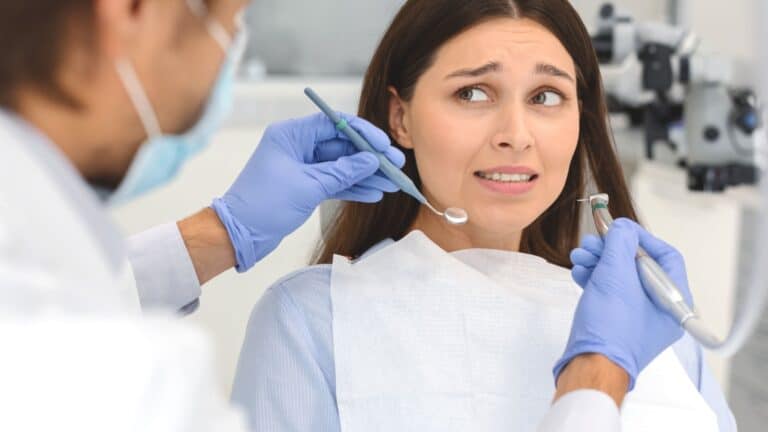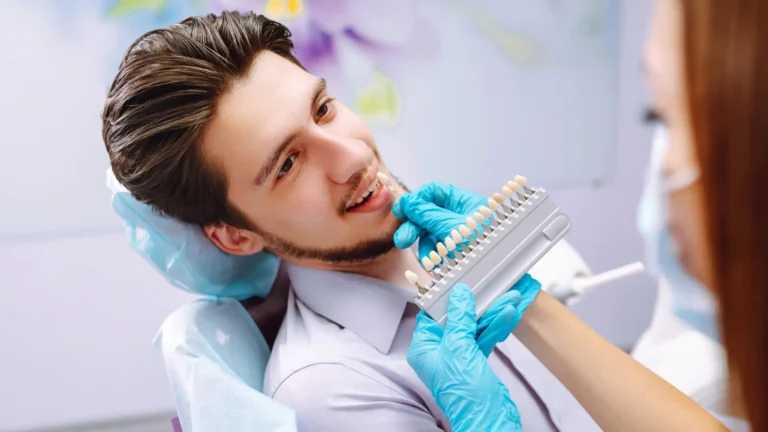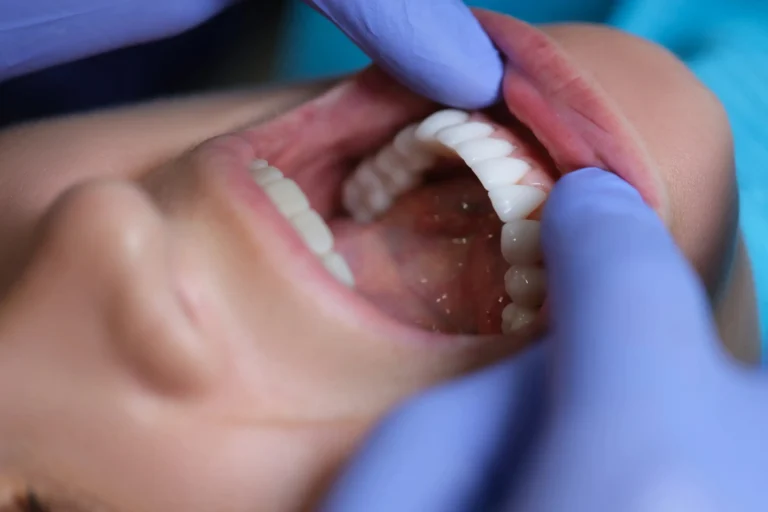There’s never a good time for anything to go wrong with your health. When an oral health problem suddenly impacts your life or you hit your face and lose a tooth, you may panic and worry —and you may be in a lot of pain.
Waiting for a dental appointment when you’re experiencing considerable discomfort and anxiety is unpleasant. But when does a dental issue cross the line and become an emergency that requires immediate attention?
In this article, we’ll clarify what a dental emergency is, what you should do until you can get to the practice, and what to expect when you get here.
What Is Classed as a Dental Emergency?
Although any acute dental problem might affect your daily routine, some problems need seeing within days, while we need to treat others immediately. Here are some of the most common dental emergencies.
A Knocked Out Tooth
If a tooth has fallen out because of an injury, we might be able to save it if we get to see you soon enough.
Pick up your tooth, avoiding touching its root. Where possible, rinse it under a tap. Place the tooth back into the hole it came out of and bite down on a clean piece of cloth. If this isn’t possible, put the tooth in milk and bring it to your emergency appointment.
An Abscess
An abscess occurs when you have a dental infection. The symptoms are swelling in the gums around the base of your tooth and pockets of pus. You may also have a fever and tender lymph nodes.
If you have any of the symptoms of a dental abscess, call for an emergency appointment. We need to treat your abscess and the infection immediately. If this serious infection spreads further, it could potentially become life-threatening.
While you’re waiting to see us, avoid hot food and drink, don’t floss around the abscessed tooth, and use a soft toothbrush to keep your mouth clean.
Although your abscess may cause considerable discomfort, don’t use painkillers or numbing gels until you’ve seen us. If possible, rinse your mouth with warm salt water before your appointment, as this will draw the pus to the surface.
Uncontrollable Bleeding From the Mouth
If you’ve been injured in your mouth and you’re bleeding uncontrollably, it’s important to seek emergency care.
If you’re experiencing severe bleeding as a result of trauma to the face, go to the Accident and Emergency department of your nearest hospital. If you’re in doubt, call us or dial 111, and our team or the NHS helpline advisor will recommend the best course of action.
What Is Not Classed as a Dental Emergency?
Several dental problems should be treated seriously and require attention as soon as possible, but they may fall short of needing an emergency appointment. These include:
- Chips or cracks in your teeth – Unless there are sharp edges that could damage your mouth
- A damaged or missing crown or filling
Are Toothaches a Dental Emergency?
A toothache should never be ignored. It might be a sign that you have a cavity or an infection. Even though a toothache can cause considerable discomfort, it’s not usually an emergency. That said, you should take action if you have a toothache and make a non-emergency appointment at the earliest convenient opportunity.
If your toothache has other symptoms, like a damaged tooth, jaw or mouth pain, swelling, or pus, call us to determine whether we need to see you immediately.
What Happens During an Emergency Dental Appointment?
After calling us to book your emergency dental appointment, we’ll advise you when you should see us and give you immediate care instructions. We aim to see you as soon as possible when you arrive.
We’ll begin by examining the problem and may need to take scans or X-rays. If necessary, we’ll give you pain relief.
When replacing a missing tooth, we aim to get it back into position as soon as possible. We may use a splint to support it, which we’ll remove later. If we cannot put your tooth back, we may discuss other replacement options, like implants or bridges.
An abscess may need to be drained. Depending on the tooth’s condition, we may also perform a root canal treatment or an extraction.
If you require ongoing care following your dental emergency, we’ll implement a treatment plan and discuss the next steps.
Dental Emergencies in Ipswich
Some dental problems cannot wait days or weeks. We need to see you immediately to prevent further, more severe issues or to save your smile.
At Quest Dental Care, our supportive team will do everything possible to treat you on the same day. Contact us to book your emergency dental appointment.
Scroll Instagram and TikTok, or watch almost anything on TV, and you’ll see perfect smiles everywhere. The accessibility of high-quality cosmetic dentistry has made it easier than ever to get the smile of your dreams, and dental veneers are one of the most popular treatment options.
Veneers can make your smile look naturally healthy and balanced. But if you’re considering getting dental veneers, you’ll likely have several questions like “what are dental veneers made of?” and “what happens during the dental veneer procedure?
You’re not alone in asking questions about dental veneers. With this in mind, we’ve compiled this guide to help you understand the benefits of veneers and what’s involved in placing and maintaining them.
1. What Are Dental Veneers?
Dental veneers are fine porcelain shells that are bonded to your teeth. They cover the fronts and sides of your teeth to improve their appearance.
2. What Can Veneers Fix?
Dental veneer treatment offers various cosmetic benefits. We can use them to repair damage like cracks and chips, build up misshapen teeth, and improve their colour and texture.
In many cases, veneers give your smile a uniform look while closing slight gaps between teeth.
Although veneers are regarded as a cosmetic treatment, repairing damaged teeth can help protect your smile and prevent tooth decay and infection.
3. How Long Will Dental Veneers Last?
As with your natural teeth, factors like your lifestyle, overall health, and commitment to maintaining good oral hygiene will all affect the longevity of your veneers.
With proper care, the average lifespan of dental veneers is around ten years. However, this could be slightly longer or shorter, depending on how you care for your smile.
4. How Do I Care for My Veneers?
The secret to looking after your veneers is to keep your teeth clean and attend regular dental checkups. Brushing twice a day, flossing, using mouthwash, and visiting our hygienist every few months are all important steps in maintaining your beautiful new smile.
You also need to remember that although porcelain is durable, it’s not as strong as the enamel which naturally coats your teeth. This means you should avoid biting or chewing any non-food items that could damage your veneers, including pen lids, ice, and your nails.
5. Are Veneers Suitable for Everyone?
Not everyone can have veneers. Certain conditions could rule them out as an option for restoring your smile. For example, grinding or clenching your teeth could damage your veneers. Similarly, issues like gum disease, dental infections, or severely crowded teeth could impact your suitability for veneers.
Where possible, we’ll create a personalised plan to treat any issues before getting veneers.
6. Can Veneers Become Stained?
Although porcelain veneers will give you a bright and healthy smile, they can become stained or discoloured over time without proper care. Cigarette smoke, tea, coffee, red wine, spicy foods, and dark berries can all stain your teeth. And although porcelain veneers have a degree of resistance to stains, they are not totally immune.
We recommend regular hygiene visits coupled with a thorough brushing routine.
7. How Are Veneers Placed?
Dental veneers are placed over two appointments. During the first session, we’ll remove a small amount of enamel from the surface of your teeth. This ensures that fine porcelain doesn’t make your teeth appear too large. To ensure maximum comfort, we’ll provide you with an anaesthetic before performing this part of the procedure.
After the lab has created your custom veneers, we’ll invite you to the clinic to place them. We’ll bond your veneers carefully into position.
8. How Many Veneers Will I Need?
Every smile differs, so we’ll create a tailored treatment plan based on your needs. You may only want a couple of veneers or choose to have veneers across your entire smile.
Whatever your needs, we’ll ensure all veneers match your smile and are the perfect size, shape, texture, and colour.
Dental Veneers in Ipswich
Dental veneers are one of the most popular and effective ways to get the smile you’ve always wanted. Before making the decision to have veneers, we recommend asking questions to ensure the treatment is right for you.
Call us today to book your consultation.



